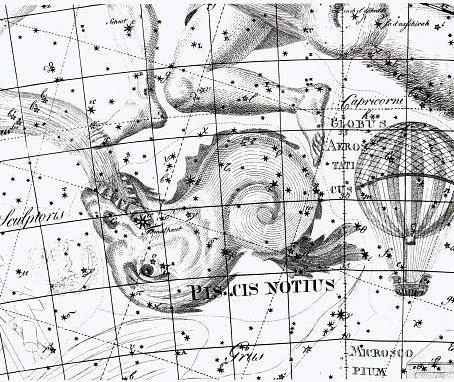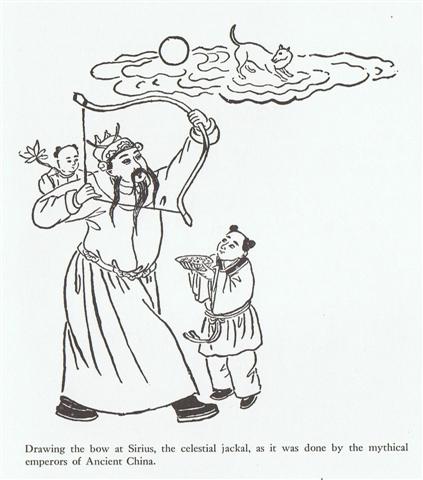|
CLOSE TO THE FULL MOON: |
|
DEC 7 (*261) |
8 |
9
(7 * 7 * 7) |
10 |
11 (345) |
12 (*266) |
 |
 |
 |
 |
 |
 |
|
Gb2-6 (9 * 29) |
Gb2-7 |
Gb2-8 |
Gb2-9 (35) |
Gb2-10 |
Gb2-11 (266) |
|
BUNDA (Foundation) / KAKKAB
NAMMAΧ (Star of Mighty Destiny) |
θ Piscis Austrini (330.1), λ Oct.
(330.7) |
|
Al Sa'd al Su'ud-22 (Luckiest of the
Lucky) /
Emptiness-11 (Rat)
TSIN =
36 Capricorni
(325.2),
ALPHIRK (The Flock) =
β
Cephei
(325.7),
SADALSUD =
β
Aquarii,
ξ
Gruis (325.9) |
No star listed (326) |
CASTRA = ε Capricorni
(327.2),
BUNDA = ξ Aquarii
(327.5)
SIRIUS (α Canis Majoris)
|
Mahar sha hi-na
Shahū-26 (Western One in the Tail of
the Goat)
NASHIRA
=
γ
Capricorni
(328.0),
ν
Oct. (328.3),
AZELFAFAGE
=
π¹
Cygni,
κ
Capricorni (328.7) |
Arkat sha hi-na
Shahū-27 (Eastern One in the Tail of
the Goat)
ENIF (The Nose) =
ε
Pegasi, ERAKIS =
μ
Cephei
(329.2),
46 CAPRICORNI,
JIH (the Sun)
=
κ
Pegasi
(329.3),
ι
Piscis Austrini (329.4),
λ
Capricorni (329.6),
ν
Cephei (329.7),
DENEB ALGIEDI =
δ
Capricorni
(329.8)
*288.0 = *329.4 - *41.4 |
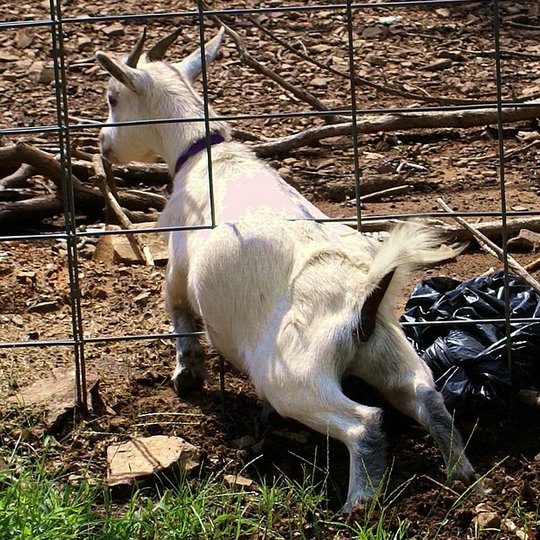 |
|
Febr 9 (40) |
10 |
(343 + 64) |
(408 = 43 + 365) |
13 |
All Hearts' Day |
|
... On February 9 the Chorti Ah
K'in, 'diviners', begin the
agricultural year. Both the 260-day
cycle and the solar year are used in
setting dates for religious and
agricultural ceremonies, especially
when those rituals fall at the same
time in both calendars. The ceremony
begins when the diviners go to a
sacred spring where they choose five
stones with the proper shape and
color. These stones will mark the
five positions of the sacred
cosmogram created by the ritual.
When the stones are brought back to
the ceremonial house, two diviners
start the ritual by placing the
stones on a table in a careful
pattern that reproduces the
schematic of the universe. At the
same time, helpers under the table
replace last year's diagram with the
new one. They believe that by
placing the cosmic diagram under the
base of God at the center of the
world they demonstrate that God
dominates the universe. The priests
place the stones in a very
particular order. First the stone
that corresponds to the sun in the
eastern, sunrise position of summer
solstice is set down; then the stone
corresponding to the western, sunset
position of the same solstice. This
is followed by stones representing
the western, sunset position of the
winter solstice, then its eastern,
sunrise position. Together these
four stones form a square. They sit
at the four corners of the square
just as we saw in the Creation story
from the Classic period and in the
Popol Vuh. Finally, the center stone
is placed to form the ancient
five-point sign modern researchers
called the quincunx ...

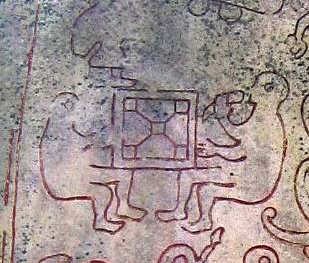
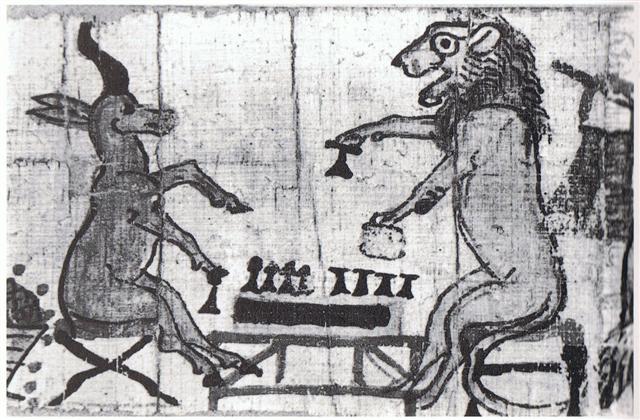 |
|
°Febr 5 |
6 |
7 |
8
(*324) |
9 |
10 (41) |
|
'Jan 13 (378) |
14 |
15 (*300) |
16 |
17 |
18 (383) |
|
"Dec 30 |
31 |
"Jan 1 |
2 |
3 (368) |
4 |
|
CLOSE TO THE SUN: |
|
JUNE 7 (*78) |
8 |
9 |
10 (161) |
11 |
12 |
|
Fibonacci: 1, 1, 2, 3, 5, 8, 13, 21,
34, 55 ... → 1.618033998 ... = φ =
(1 + √5) / 2.
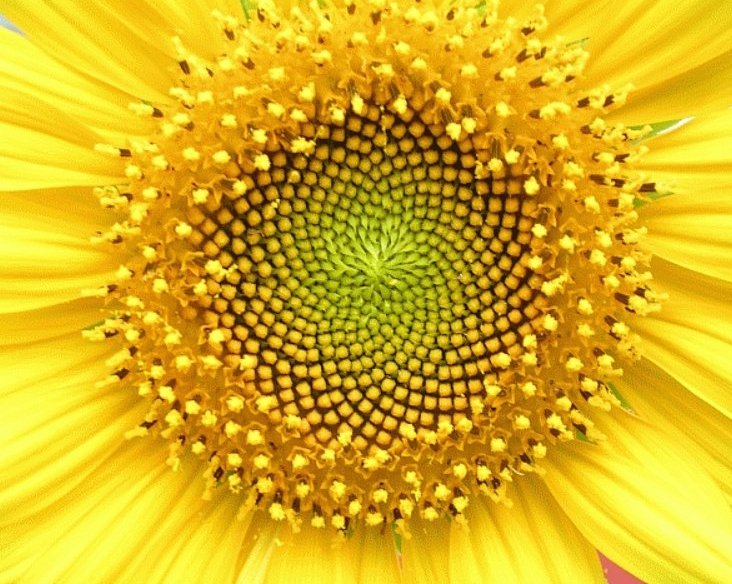
... The month, which takes its name
from Juppiter the oak-god, begins on
June 10th and ends of July 7th.
Midway comes St. John's Day, June
24th, the day on which the oak-king
was sacrificially burned alive. The
Celtic year was divided into two
halves with the second half
beginning in July, apparently after
a seven-day wake, or funeral feast,
in the oak-king's honour
...
.jpg) |
|
The Knot (Ukdah) |
5 Imix 9 Kumk'u
Rishu A.-13 (Head of the Lion)
ψ Leonis (146.4),
RAS ELASET AUSTRALIS = ε Leonis
(146.6)
*105.0 = *146.4 - *41.4 |
VATHORZ PRIOR = υ Carinae
(147.9) |
|
Star-25 (Horse) /
ANA-HEU-HEU-PO-5 (Pillar where
debates were held)
ALPHARD (The Horse)
=
α
Hydrae
(142.3),
ω
Leonis (142.6),
τ¹
Hydrae (142.7) |
Al Tarf-7 (The End)
ψ
Velorum (143.3),
ALTERF =
λ
Leonis,
τ²
Hydrae (143.4),
ξ
Leonis (143.5)
*102.0 = *143.4 - *41.4 |
A Hydrae
(144.1)
VEGA (α Lyrae)
|
Creation of our present world
UKDAH (Knot) =
ι
Hydrae
(145.4),
κ
Hydrae (145.5),
SUBRA =
ο
Leonis
(145.8)
*104.0 = *145.4 - *41.4
ALPHEKKA MERIDIANA |
|
Aug 10 |
11 |
12 |
13 (*145) |
14 |
15 (227) |
|
°Aug 6 |
7 |
8
(220) |
9 |
10 |
11 (*143) |
|
'July 14 |
15 |
16 |
17 (*118) |
18 |
19 (200) |
|
"June 30 |
"July 1 |
2 |
3 (*104) |
4 |
5
(186) |
|
Itzam-Yeh
defeated |
28 May
(148), 3149 BC |
|
1st
3-stone place |
21 May
(141), 3114 BC |
|
Creation
of our present world |
13 August
(225), 3114 BC |
|
Och ta
chan (Hun-Nal-Ye
'entered or became the
sky') |
5
February (36), 3112 BC |
|
21 May, 3114 BC - 5 February, 3112 BC = 542 |
|
542
'happens to be' the sum
of 365 days and 6 * 29½
nights. |
.. In three
magnificent texts at the site of
Koba, scribes recorded it
as one of the largest finite
numbers we humans have ever
written. According to these
inscriptions, our world was
created on the day 4 Ahaw 8
Kumk'u. On this day all the
cycles of the Maya calendar
above twenty years were set at
thirteen - that is to say, the
cycles of 400 years, 8,000
years, 160,000 years, 32,000,000
years, and so on, all the way up
to a cycle number extending to
twenty places (2021 *
1360-day year).
In our calendar,
this day fell on August 13, 3114
BC. To understand what this
means, we need a little scale.
The thirteens in this huge
number act like the twelve in
our cycles - the next hour after
twelve is one.
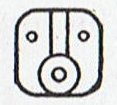
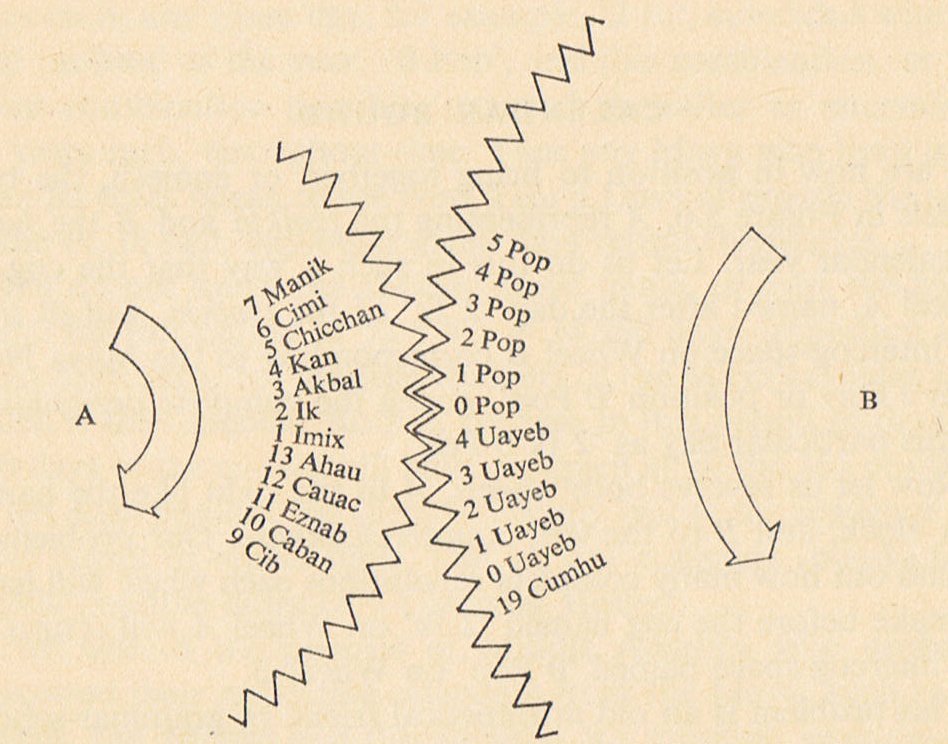
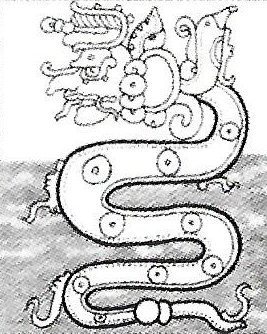
Thirteen changed
to one as each of these cycles
in the Maya calendar was
completed, therefore, we have
the following sequence:
|
13. |
13. |
13. |
0. |
0. |
0. |
1. |
5
Imix |
9
Kumk'u |
(Aug.
14, 3114 B.C.) |
|
13. |
13. |
13. |
0. |
0. |
1. |
0. |
11
Ahaw |
3 Pop |
(Sept. 2, 3114 B.C.) |
|
13. |
13. |
13. |
0. |
1. |
0. |
0. |
13
Ahaw |
3
Kumk'u |
(Aug.7, 3113 B.C.) |
|
13. |
13. |
13. |
1. |
0. |
0. |
0. |
2
Ahaw |
8 Mak |
(May
1, 3094 B.C.) |
|
13. |
13. |
1. |
0. |
0. |
0. |
0. |
3
Ahaw |
13
Ch'en |
(Nov.
15, 2720 B.C.) |
|
13. |
13. |
13. |
0. |
0. |
0. |
0. |
4
Ahaw |
3
K'ank'in |
(Dec.
23, A.D. 2012) |
|
13. |
1. |
0. |
0. |
0. |
0. |
0. |
10
Ahaw |
13
Yaxk'in |
(Oct.
15, A.D. 4772) |
|
1. |
0. |
0. |
0. |
0. |
0. |
0. |
7
Ahaw |
3
Zotz' |
(Nov.
22, A.D. 154587) |
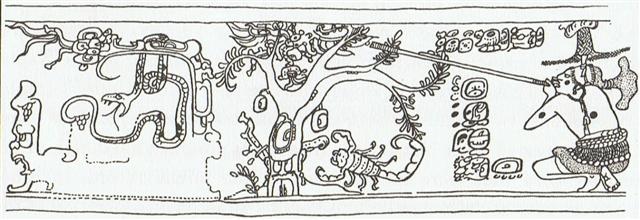
... This
pot depicts one of the Hero
Twins (One-Ahaw in the
Classic texts and
One-Hunaphu in the K'iche'
Popol Vuh) and a great bird
who is trying to land in a
huge ceiba tree heavy with
fruit. This mythical bird is
Itzam-Yeh, Classic
prototype of Wuqub-Kaqix,
'Seven-Macaw', of Popol Vuh
fame. In that story, in the
time before the sky was
lifted up to make room for
the light, the vainglorious
Seven-Macaw imagined himself
to be the sun. Offended by
his pride, the Hero Twins
humbled him by breaking his
beautiful shining tooth with
a pellet from their blowgun.
This pot shows One-Ahaw
aiming at the bird as he
swoops down to land in his
tree. As Itzam-Yeh
lands on his perch, the text
tells us he is 'entering or
becoming the sky'.
This particular
'sky-entering' is not the
one mentioned in the
Palenque text. It is the
final event that occurred in
the previous creation before
the universe was remade.
Before the sky could be
raised and the real sun
revealed in all its
splendor, the Hero Twins had
to put the false sun,
Itzam-Yeh, in his place.
If the date on this pot
corresponds to that
pre-Columbian event, as we
believe it does, then
Itzam-Yeh was defeated
on 12.18.4.5.0.1 Ahaw
3 K'ank'in (May 28,
3149 B.C.). After the new
universe was finally brought
into existence, First Father
also entered the sky by
landing in the tree, just as
Itzam-Yeh did ...
|
The flow of sweet water
(the serpent) ran down in quite orderly fashion and the
top of the roof became visible again, then followed
by the rest of the House.
It seems evident that
the G text here was in parallel with the Chinese
zodiac.
|
11 |
Emptiness |
β Aquarii
(Sadalsud) |
Rat |
Febr 9
(405) |
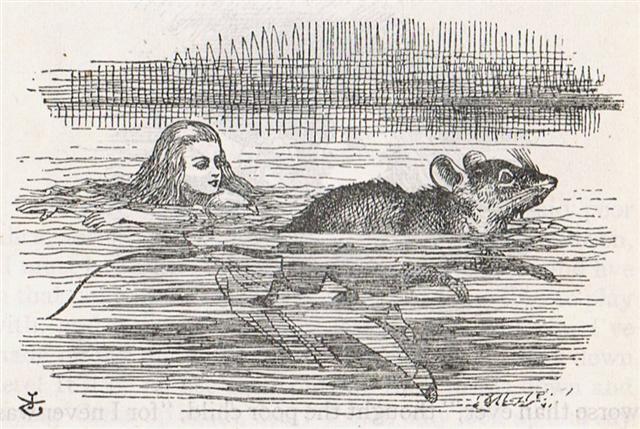
... In
China, with Capricornus,
Pisces, and a part of
Sagittarius, it [Aquarius]
constituted the early
Serpent, or Turtle, Tien
Yuen; and later was
known as Hiuen Ying,
the Dark Warrior and Hero,
or Darkly Flourishing One,
the Hiuen Wu, or
Hiuen Heaou, of the Han
dynasty, which Dupuis gave
as Hiven Mao. It was
a symbol of the emperor
Tchoun Hin, in whose
reign was a great deluge;
but after the Jesuits came
in it became Paou Ping,
the Precious Vase. It
contained three of the sieu,
and headed the list of
zodiac signs as the Rat,
which in the far East was
the ideograph for 'water',
and still so remains in the
almanacs of Central Asia,
Cochin China, and Japan ...
 |
|
12 |
Rooftop |
α Aquarii (Sadalmelik) |
Swallow |
Febr 18 (414) |
 |
|
13 |
House |
α Pegasi (Markab) |
Pig |
March 5 (429) |
 |
10 days after the Wall at the Wing (Al-genib)
of the Pegasus Horse followed Legs:
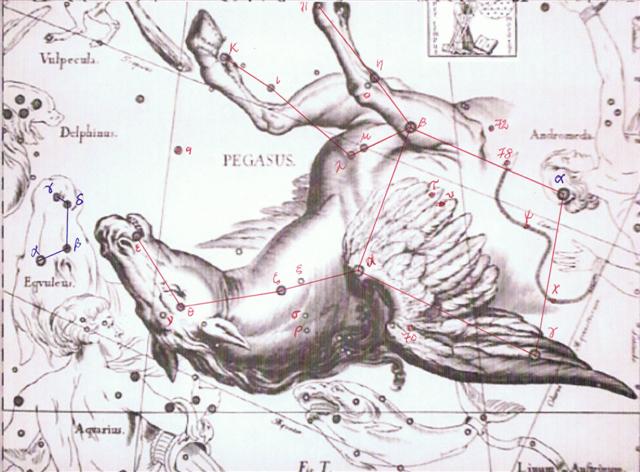
|
14 |
Wall |
Algenib (γ Pegasi) |
Porcupine |
March 22 (81 = 446) |
 |
|
15 |
Legs |
η
Andromedae |
Wolf |
April 1 (91 = 456) |
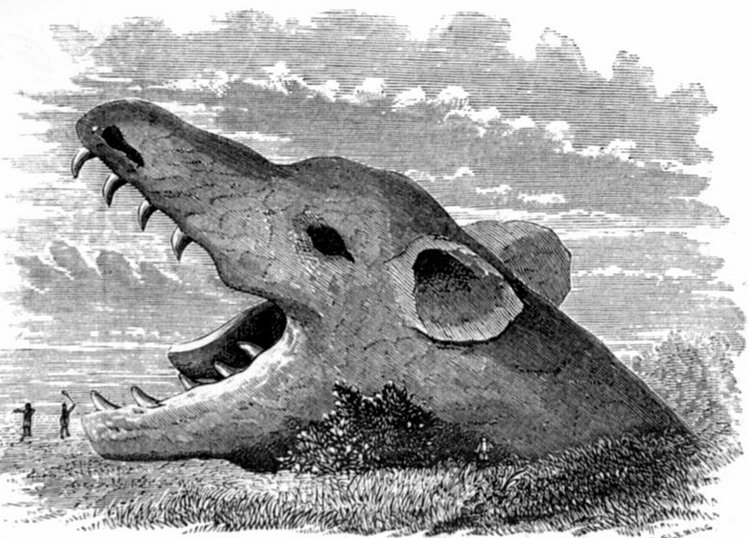
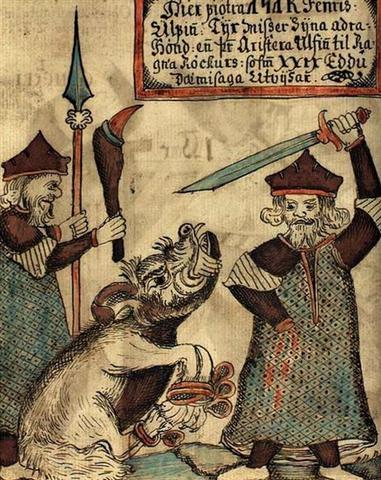
.jpg)
Φ(φ)
... The king, wearing now a
short, stiff archaic mantle,
walks in a grave and stately
manner to the sanctuary of the
wolf-god Upwaut, the
'Opener of the Way', where he
anoints the sacred standard and,
preceded by this, marches to the
palace chapel, into which he
disappears. A period of time
elapses during which the pharaoh
is no longer manifest. When he
reappears he is clothed as in
the Narmer palette, wearing the
kilt with Hathor belt and
bull's tail attatched. In his
right hand he holds the flail
scepter and in his left, instead
of the usual crook of the Good
Shepherd, an object resembling a
small scroll, called the Will,
the House Document, or Secret of
the Two Partners, which he
exhibits in triumph, proclaiming
to all in attendance that it was
given him by his dead father
Osiris, in the presence of
the earth-god Geb. 'I
have run', he cries, 'holding
the Secret of the Two Partners,
the Will that my father has
given me before Geb. I
have passed through the land and
touched the four sides of it. I
traverse it as I desire.' ...
|
 |
 |
|
Eb6-1 (185) |
maitaki |
|
At this place (the Full Moon at April 1) the Sun
would reach the last day in
September. 365 + 91 - 183 = 273 = 3 * 91.
|
24
|
CLOSE
TO THE FULL MOON: |
|
JAN 25 |
26 |
27 (392 = 365 + 27) |
28 (*313) |
 |
 |
 |
 |
|
Gb3-20 (310) |
Gb3-21 |
Gb3-22 (285 + 27) |
Gb3-23 (229 + 84) |
|
ξ
Phoenicis (9.0),
ρ
Tucanae (9.1),
DENEB KAITOS (Tail
of the Sea Beast) =
β Ceti, η Phoenicis
(9.4), AL NITHĀM
(String of Pearls) =
φ¹ Ceti
(9.6)
*333.0 = *9.4 -
*41.4 |
ACHIRD (Woman with
Luminous Rays) = η
Cassiopeiae
(10.7) |
Legs-15 (Wolf)
ν
Andromedae (11.0),
φ²
Ceti (11.1),
ρ
Phoenicis (11.2),
η
Andromedae (11.4)
*335.0 = *11.4 -
*41.4 |
CIH (Whip) = γ
Cassiopeiae, λ
Tucanae (12.4),
φ³ Ceti (12.6), μ
Andromedae (12.8)
*336.0 = *12.4 -
*41.4 |
|
March 30 (*374) |
31 (90) |
April 1 (429 + 27) |
2 (457 = 365 + 92) |
|
... At the beginning
of 44 B.C. - when
Ceasar was still
alive - the Senate
decided to raise
statues of him in
all the temples and
to sacrifice to him
on his birthday in
the month
Quintilis, which
in honour of him was
renamed July. He was
raised to the status
of a god (among the
other gods of the
state) under the
name Jupiter Julius.
Marcus Antonius, who
this year was consul
together with
Caesar, became high
priest and
responsible for the
ceremonies. In the
middle of February,
at the time of the
old feast of
Lupercalia [Lupus
= Wolf], he ran
around naked and
whipped the Roman
ladies with thongs
made from goat-skin
[februa], in
order to promote
their fertility
...

From
day 45 (= 31 + 14)
in Roman times to
the Whip star rising
heliacally in April
2 (92) there were 47
days, but the rays
from the rising Sun
would make the star
invisible for
another 15 days. 92
+ 15 = 107 (= 472 -
365 = 1½ * 314 -
364). |
|
CLOSE TO THE SUN: |
|
JULY 26 |
27 (*128) |
28 (182 + 3 * 9 = 11
* 19) |
29 (210) |
|
Al Įwwā'-11 (The
Barker) /
Shur-mahrū-shirū-18
(Front or West Shur)
SOMBRERO GALAXY =
M104 Virginis
(191.1),
ρ
Virginis (191.4),
PORRIMA =
γ
Virginis,
γ
Centauri (191.5)
*150.0 = *191.4 -
*41.4 |
ι Crucis (192.2), β
Muscae (192.5),
MIMOSA = β Crucis
(192.9) |
No star listed (193) |
κ Crucis (194.4),
ψ
Virginis (194.5),
μ
Crucis,
λ
Crucis (194.6),
ALIOTH (Fat Tail) =
ε Ursae Majoris,
ι
Oct.
(194.8)
*153.0 = *194.4 -
*41.4 |
|
Sept 28 |
29 (*192 = *128 +
*64) |
(182 + 27 + 64 = 3 *
91) |
Oct 1 |
|
... The Sensitive
plant (Mimosa
pudica L.) is a
creeping annual or
perennial herb often
grown for its
curiosity value: the
compound leaves fold
inward and droop
when touched,
re-opening within
minutes. Mimosa
pudica is native
to Brazil, but is
now a pantropical
weed. Other names
given to this
curious plant are
Humble plant,
TickleMe plant,
Shame plant,
Sleeping Grass,
Prayer plant,
Touch-me-not,
Makahiya
(Philippines,
meaning 'shy'),
Mori Vivi (West
Indies), mate-loi
(false death)
(Tonga) ... In the
evening the leaflets
will fold together
and the whole leaf
droops downward. It
then re-opens at
sunrise
...
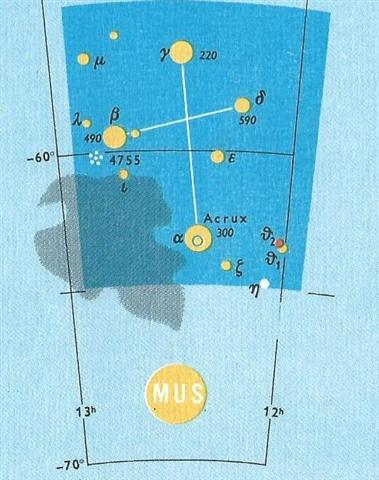 |
... 'Hey, you! That was well done!' ... [E:27-30]
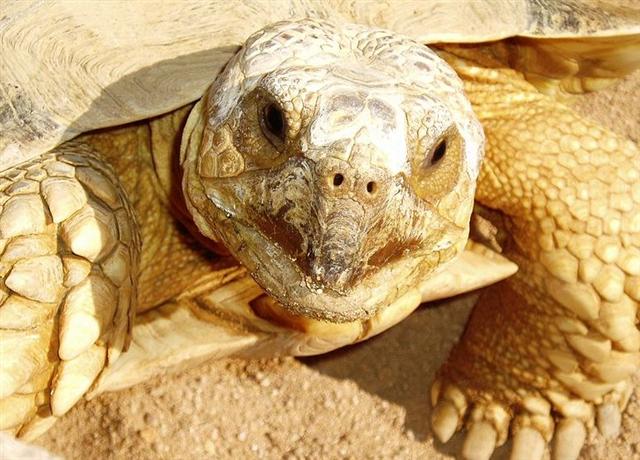
|






.jpg)







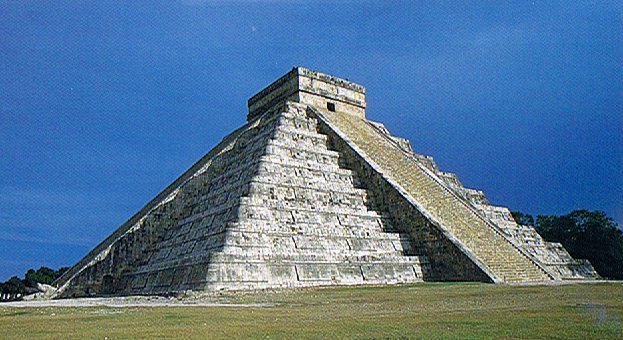



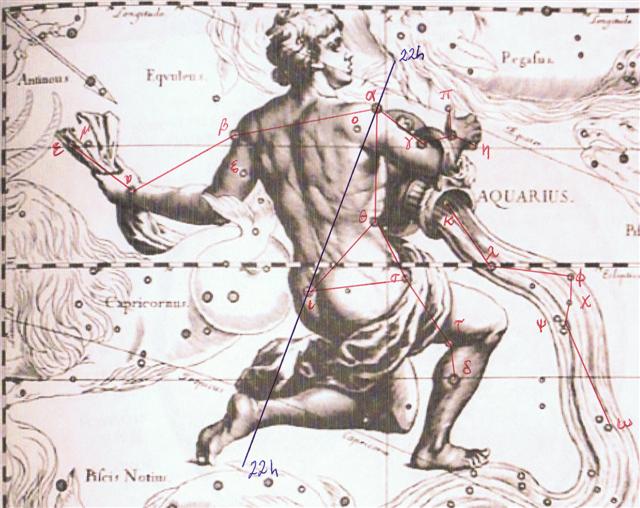








.jpg)


